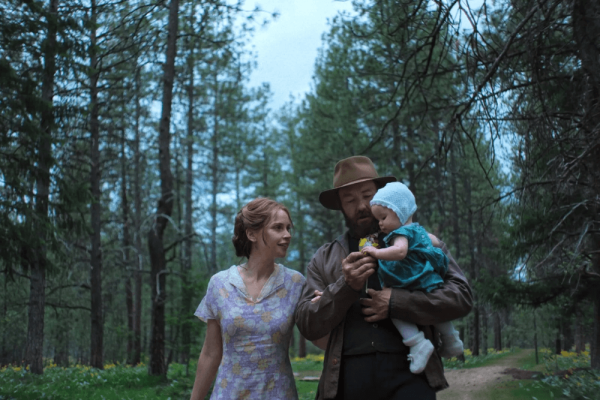I’m not someone who is drowning in nostalgia for my past. In recent years, my white, U.S. evangelical community has dominated headlines due to its overwhelming support for former President Donald Trump and the Christian nationalism, nativism, and white supremacist patriarchy that he and other Republicans promised. I’ve looked on with a heavy heart, trying to untangle my current faith from the cultural identity of my upbringing.
Despite all the outsized power and privilege that my community holds, there is a dearth of spaces where people can process what it means to have grown up in the belly of it. Fortunately, there’s a whole slew of new films and documentaries that focus on white evangelical youth culture, offering some of us the chance to reflect on our upbringings as we figure out what it means to have white evangelical roots in a post-Trump world.
A Week Away
I surprised myself by squealing, “That’s my culture!” as I watched Netflix’s A Week Away, a Christian musical about a wayward teen who finds community (and God?) at summer camp. It was the modest one-piece swimsuits and board shorts that prompted my outburst. I found myself belting out classic Steven Curtis Chapman songs as I watched High School Musical knockoffs sing and dance at a Christian camp. I was laughing and cringing and — yes — feeling surprised to see my culture represented.
But was I, really? I’m a white, middle-class, cisgender Christian woman. My culture is represented, well, everywhere. And yet there was something about A Week Away that struck me in a new way. It was an actual attempt to show evangelical youth culture without (too much) embellishment — complete with ‘90s evangelical ballads, camp games, and a fireside conversion moment. If you took away all the dancing and added a few more talks about sexual purity, A Week Away was a decent representation of what it was like for me to go to Christian camp every summer of my teenage years. It will not be remembered as a particularly good movie — the plot is thin and the resolution is extremely unearned — but I do think it’s an important one for the cultural moment we are finding ourselves in.
This movie is intended squarely for a Christian audience — no real stakes or drama, no swear words. True to evangelical form, toxic masculinity appears throughout the film in ways both banal and disturbing. A major plot point is the warfare games the rival teams play against each other — culminating in an epic paintball fight where they wear full tactical gear and shoot each other as Audio Adrenaline's song “Big House” plays in the background.
It seems harmless enough — and the nostalgic flashbacks give their own kind of reward — but the underlying themes of both Christian warfare and solving complex issues with a single teary prayer by a campfire remain troubling. A Week Away is a Christian-lite movie. It still presents the genre’s classic themes of Christian supremacy and prosperity gospel, but with a bit more subtlety.
YouthMin
YouthMin is a mockumentary now available on Amazon that follows a youth pastor taking his group of quiet and sullen teenagers to Bible camp. But this film has both a sillier and a darker edge (and more sex jokes) than A Week Away. The titular youth minister, David (played by the co-director, Jeff Ryan), is an amalgamation of every hapless church leader I had growing up: juvenile, goofy, self-absorbed, and erratic — a Michael Scott type of character. While David embodies a (sadly) true-to-life youth minister archetype, his character gives the audience a chance to reflect on the toxic Christian masculinity he portrays and the burdens it places on all those around him. As a viewer (and someone who grew up in this culture), I struggled with the pull to empathize with David, and instead found myself loving the small cast of weirdos (the goth girl, the boy who never speaks, the goofy jock) who made up the youth group. For anyone who has ever been crammed into a minivan with other teens on a forced road trip to camp, the flashbacks on this one will be visceral. And hopefully, not 100 percent unpleasant.
Electric Jesus
The new movie Electric Jesus takes us out of the Christian camp and into the Christian music world — specifically evangelical hair metal bands in the 1980s. It’s a movie that centers on an earnest, devout sound guy named Eric and the Christian band he tours with for a summer. The band, named 316, hopes to make it big and “make God famous” with their music. One of the songs, “Commando for Christ,” is the perfect mix of hilarity and sincerity, blending religious warfare imagery with naivete. The teenage yearnings of the main characters show both the sweetness and the absurdities of Christian culture. These white evangelicals are not simply a group of teens separate and safe from the world — they are complex and hormone-addled kids who legitimately desire to love God in the ways that have been made available to them.
It’s hilarious, and often heartbreaking, what happens when these kids come up against the world, exposing the limitations of Christian culture and youth group theology. The band scores a gig in an infamous bar to prove they can tour in “secular spaces” but, overcome with the moment, they decide to lead an altar call. The results are disastrous: The teens are hit with beer bottles as they’re booed off stage — a moment that signifies the demise of both the band and their ministry aspirations.
Chris White, director of Electric Jesus, wanted the bar scenes to be scary and claustrophobic, as atheists sneer at the Christian youth; essentially, he wanted to portray the bar how evangelical Christians would have pictured it. Both the point of view and the soundtrack of Electric Jesus are nostalgic gold mines for people who grew up in proximity to Christian music.
Parallel Love: The Story of a Band Called Luxury
Parallel Love: The Story of a Band Called Luxury is a documentary following an alternative group that released several albums in the 1990s on Tooth & Nail, one of the most influential record labels of my young adult life. Luxury has an interesting backstory: Conservative Christian boys from Georgia produce genre-bending and purposefully provocative lyrics dealing with issues of sex, gender, and more that made them very poor sellers in the Christian market. An almost-fatal car crash changes the course of their life, and now three out of the five members are currently Orthodox priests (and still rocking out together).
While the film shows some of the spiritual elements of their musical journey, it mostly examines the heady time period where something new and exciting and weird was happening on the fringes of Christian youth culture. Before Christian music became completely swallowed up by the industrial worship complex, the genre contained bright lights of weirdness.
Strange Negotiations
The second documentary, Strange Negotiations, depicts one of these lights in my own life. This film follows musician David Bazan as he tours the country giving house shows and reeling from the political implications of 2016. Bazan, the force behind Pedro the Lion (another Tooth & Nail band that was very successful in the evangelical world of the 1990s), eventually left Christianity very publicly. His 2009 album, Curse Your Branches, was a break-up album with God that shocked and moved many of his avid fans. Bazan modeled “deconstruction” before it became a Christian buzzword. Through his music, he both questioned some of Christianity’s core doctrines (hell, original sin) and also pointed out the toxic political and social fruits being birthed out of evangelicalism.
Watching Bazan play and sing and bare his soul in little house shows across the country stirred something in me. This is a person who is a troubadour of our times, someone trying to pay penance for past sins, someone trying very hard to be honest about what growing up evangelical has done to his soul. Strange Negotiations — like A Week Away, YouthMin, Electric Jesus, and Parallel Love — also gives the viewer the space to process some of these same questions.
These movies, set at Christian concerts and camps, will transport many of us back to the times when our religious culture was obsessed with forming boundaries — what was good and safe and Christian and what wasn’t. As people develop and hopefully move beyond these carefully bounded sets, feelings of disillusionment, anger, and betrayal can creep in. It’s easy to want to distance ourselves from the Donald Trump era of white evangelical politics. Many of us who grew up evangelical are learning how to have a worldview and a faith that encourages us to be reconciled to the world and our neighbors — and to ourselves, especially younger versions of ourselves.
This current crop of Christian movies makes space for that reconciliation. Gentle humor, cringe-worthy moments, and a focus on the earnestness of youthful religious desire in the American context are all great inroads to help us look at the rigidity many of us came from with somewhat compassionate eyes. In order to keep processing the toxic Christian nationalism of white evangelicalism in the United States, it’s important to continue to cultivate the discipline of curiosity in ourselves and in our backgrounds to keep going forward in the work of love, justice, and mercy.
Got something to say about what you're reading? We value your feedback!







